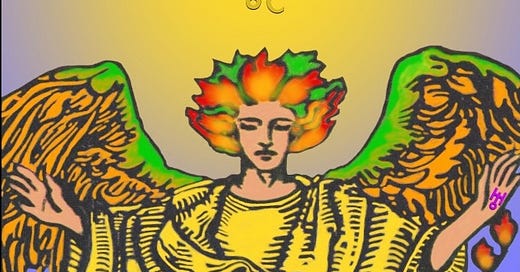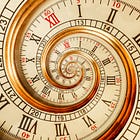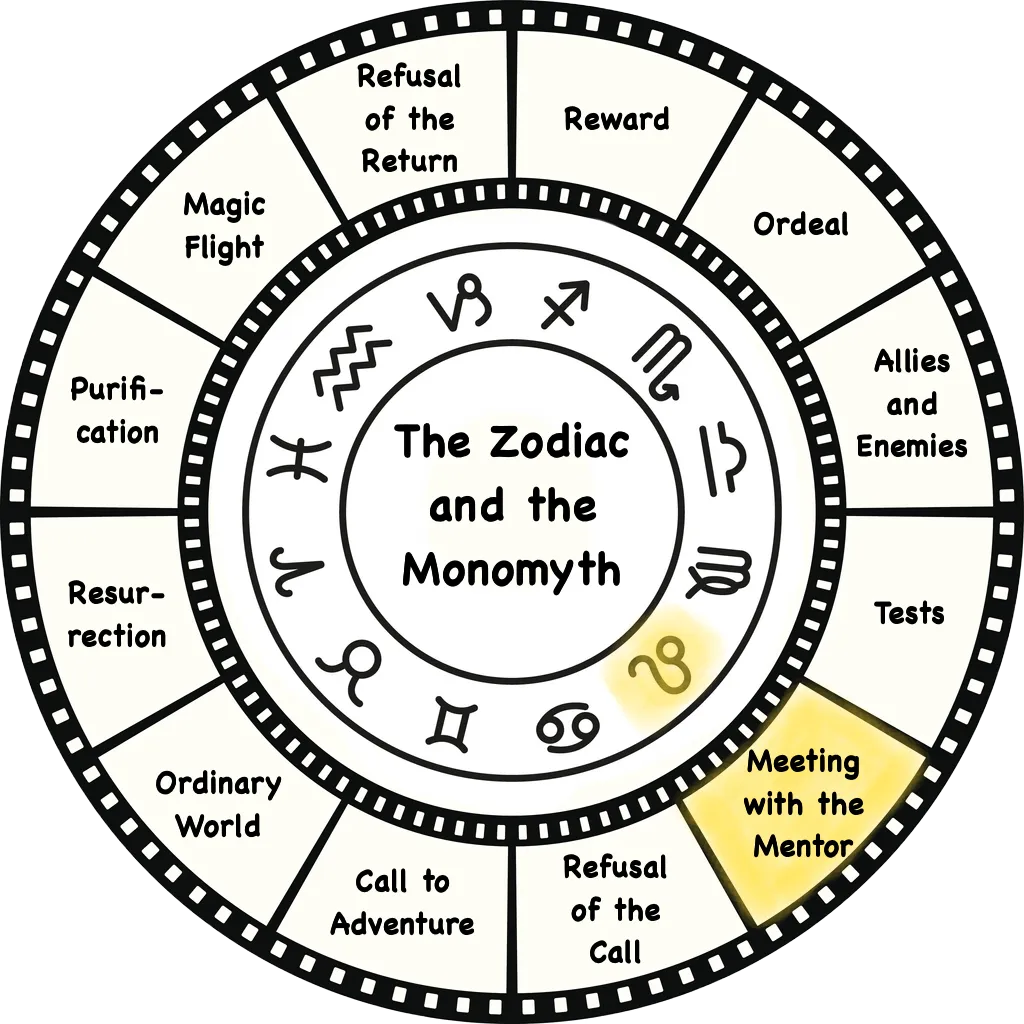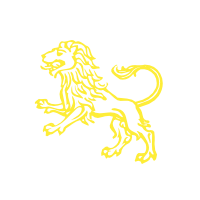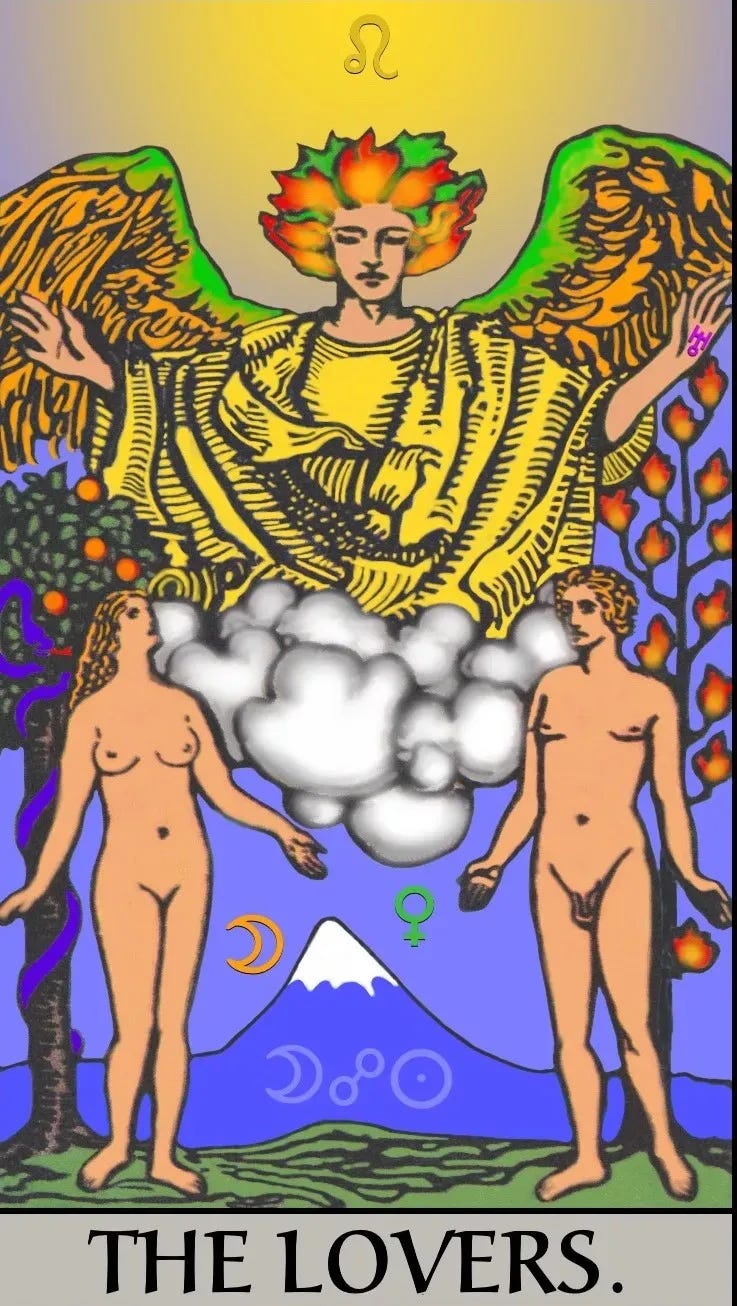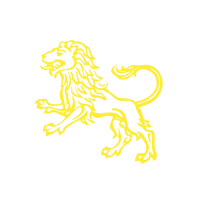Quest for the Elixir
This post is part of an ongoing series. If you’re new to it, you’ll want to read the introduction first (about 6 minutes):


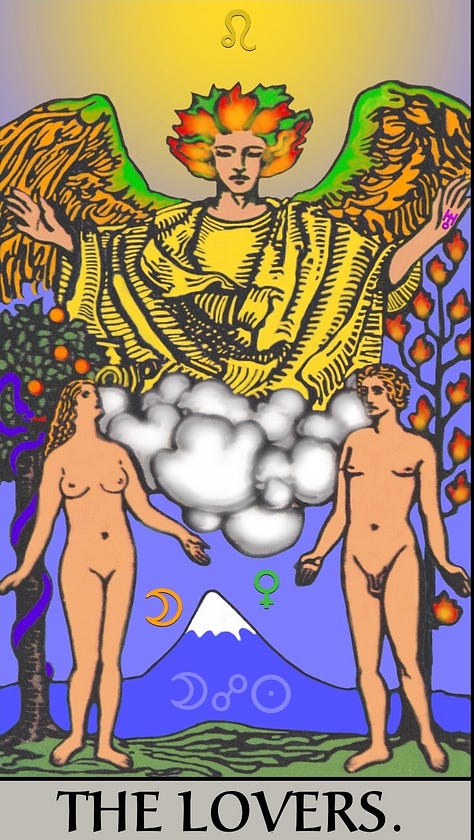
Three Articles About a Chapter of the Universal Story
Each edition of Quest for the Elixir consists of three articles about one of the 12 chapters in the cyclical Universal Story.
The first article is an exploration of the chapter from the perspective of the Hero’s Journey in Joseph Campbell’s monomyth.
The second article is a view of the same chapter in terms of the Zodiac sign corresponding to it in the cycle.
The third article is about the meaning of the chapter as symbolized in a Major Arcana card of the tarot.
During the month of the Sun’s transit through Leo, we observe the chapter of Incentives in the Universal Story. In celebration, I offer the following three articles:
The Monomyth: The Meeting with the Mentor
"There is what I would call the hero journey, the night sea journey, the hero quest, where the individual is going to bring forth in his life something that was never beheld before." ~ Joseph Campbell
"The adventure is always and everywhere a passage beyond the veil of the known into the unknown; the powers that watch at the boundary are dangerous; to deal with them is risky; yet for anyone with competence and courage the danger fades." — Joseph Campbell
When the young hero of the monomyth has achieved basic competence within his familiar Ordinary World, he is ready to cross the threshold into the Special World. The right time arrives, and it happens. Naturally and spontaneously, he steps over the boundary. This crossing is equivalent to the start of adolescence, when new hormones and new courage ‘kick in’. As dependency and fears of the “bogeyman” recede, individuality begins to bloom, often in response to the glamorous, incentivizing enchantment of an inspirational new archetype, the Mentor.
Adolescence is an unsettling period of youth, notorious for detachment, even rebellion, from the family. Why should that be? Because each young person is potentially more than a mere clone of his tribe, and needs new experiences beyond what his family can provide. As Nature intends, he is developing into an individual adult with qualities, interests, and abilities all his own.
But his abilities take time to develop, and his family, particularly his parents, are used to managing his life under their established rules and boundaries. They know that they will continue to be responsible for maintaining control of their child and his actions as long as he is a child. What happens to their role when he is no longer a child? What if they were to loosen their controls too soon? At this in-between time, some worry on their part, and an instinct to ‘pull back on the reins’, is only natural.
"It is the individual's task to differentiate himself from all the others and stand on his own feet. All collective identities . . . interfere with the fulfillment of this task. Such collective identities are crutches for the lame, shields for the timid, beds for the lazy, nurseries for the irresponsible. . . ." ~ Carl Jung
"One cannot free oneself by bowing to the yoke, but by breaking it." — Carl Jung
Eventually a child has to grow up. It’s his parents’ job to rein him in enough to discourage premature ‘leaps out of the family nest’, until he is adult enough to realize that it’s his job to resist their pull and claim his own rightful autonomy.
So when does his childhood end, and his autonomous adulthood begin? That’s the big question during the transitional period of adolescence. Even in the most loving of families, some confusion, ambivalence, awkwardness, and pain are likely to occur.
The hero’s adventure is — and must be — a journey into the unknown, and he must undertake it alone. Campbell tells us this about King Arthur’s knights at the start of the great quest in Arthurian legend:
“They thought that it would be a disgrace to go forth as a group. Each entered the forest at a point that he himself had chosen, where it was darkest and there was no path. If there is a path, it is someone else's path and you are not on the adventure.” ― Joseph Campbell, The Hero's Journey: Joseph Campbell on His Life & Work
"And so Galahad decided that it would be a disgrace to set off on a quest with the other knights. Alone he would enter the dark forest where there was no path. This is the myth of The Hero's Journey." — Joseph Campbell
So here is the youthful hero, all alone on his solitary quest, with neither a path nor a clue as to what to do next. Enter the Mentor.
“The big problem of any young person's life is to have models to suggest possibilities. Nietzsche says, 'Man is the sick animal.' Man is the animal that doesn't know what to do with itself. The mind has many possibilities, but we can live no more than one life. What are we going to do with ourselves?” ― Joseph Campbell, The Power of Myth
The young hero is not at a loss for long. Soon he meets some version of the Mentor, the ideal role model, who gives him the clue he needs.
The Meeting with the Mentor comes as an amazing surprise, for the Mentor is as otherworldly as the Guardian of the Threshold. But this positive archetype is the very antithesis of the negative, frightening Guardian. This one is the hero’s Hero! Instead of a spell of paralyzing fear, the Mentor casts an even more powerful spell of blissful euphoria! The hero finds himself idolizing a numinous, fascinating ‘superperson’ who seems to be magical and ABSOLUTELY WONDERFUL. He feels emotionally overwhelmed, intoxicated, exactly as though he were falling in love! In fact, he is experiencing a form of love.
"The only important thing is to follow nature. A tiger should be a good tiger; a tree, a good tree. So people should be people. But to know what people are, one must follow nature and go alone, admitting the importance of the unexpected. Still, nothing is possible without love. . . . For love puts one in a mood to risk everything, and not to withhold important elements." — Carl Jung
The Mentor shows love by noticing and praising special talents in the hero, and by honoring him for them. Instead of imposing control, as the Guardian would do, the Mentor encourages the hero to manage his situation for himself, and expresses confidence in him, offering only essential guidance and advice. Often the Mentor gifts the hero with some sort of token to serve as a reminder of that encouragement, a ‘talisman’ to draw him closer to his destiny. The hero may encounter not only one, but a series of magical Mentors, each enchanting him with a different ‘flavor’ of magic according to his current need.
So where does all the magic come from in any such special connection? It’s really coming from something wonderful within the young person himself, unconscious budding potentials that are trying to make themselves known to him. He couldn’t yet believe they were his own, so unconsciously he ‘projects’ them onto someone else who is a suitable, believable carrier. The object of his "hero worship” is always exactly the person he needs in that role, at that time. It doesn’t necessarily matter whether that person be a formal teacher, a relative, a casual acquaintance, or some public figure who doesn’t even know he exists. The ‘worshiper’ benefits even from purely imaginary favor and guidance, because what he needs most is really coming from within himself.
Youthful romance, a comparable ecstatic experience, is a variant of the same ‘projection’ dynamic. A WONDERFUL romantic interest appears, a suitable person of (usually) similar age who encourages the young hero’s development by (at least seeming to) value him for himself alone. A connection ostensibly made just for fun takes on deeper meaning for one or both parties. Whether or not the relationship is long lasting, and even if it’s not an actual relationship but only a secret crush, on some level it’s a meaningful experience of love and self-realization while it lasts.
For an adolescent making his uncertain way to adulthood, the Mentor fulfills an important need. Exciting new experiences may lead to victories or defeats. Emotional biproducts of this experimental stage can send the hero’s highs through the roof, his lows through the floor. The Mentor’s example may or may not lead to a real career. Young love may or may not develop into a lasting relationship. But through it all, he’s learning about himself, and developing. That’s how he gains the courage and coping skills he’ll need in the adult world, thanks to his Meeting(s) with the Mentor.
Here we see Dorothy’s crossing over the threshold into the Special World in The Wizard of Oz. Note that (1) it comes about as part of a spontaneous, natural event (the cyclone, or “twister”), and (2) the situation separates her from her family, forcing her to find her way alone.
The Twister
After a bewildering spin through the astral plane with its myriad free-floating images, a stunned Dorothy steps out of the farmhouse to find herself in a different world. The movie underscores her transition from the Ordinary World (Kansas) to the Special World (Oz) with a dramatic switch from black & white to Technicolor.
Dorothy Steps Into Technicolor
Dorothy begins to explore this amazing new, colorful world. Almost immediately the numinous, magical Mentor she needs arrives to meet her. It’s glamorous Glinda, the Good Witch of the North, who explains about bad witches and good witches. She tells Dorothy how thrilled the local inhabitants, the Munchkins, are that Dorothy has saved them from the Wicked Witch of the East.
The Witch of the North
Glinda and the Munchkins overflow with enthusiastic praise of Dorothy for her heroism in killing the Wicked Witch of the East. They officially (and regally!) recognize her as a champion vanquisher of evil witches, and reward her with an elaborate celebration.
Ding Dong, the Witch is Dead
Is evil totally wiped out now? Certainly it’s banished from Munchkinland, but it still lurks elsewhere in Oz in the person of the dead witch’s sister. Not to worry too much, though, because Glinda has given Dorothy the powerful Ruby Slippers!
The Ruby Slippers
Dorothy wants to return to Kansas, but how? According to Glinda, only the Great and Powerful Wizard of Oz might know. Dorothy must seek him, and Glinda provides her with a single clue: “Follow the Yellow Brick Road.” She’ll have to figure the rest out for herself.
Follow the Yellow Brick Road
Leo
The three Fire signs are all about motivation. In Aries it’s the primal motivation for survival. In Sagittarius it’s the transcendent motivation for wisdom. In Leo, the motivation is for mental development, and it strives to express and develop the consciousness and self awareness of a rational adult.
Everything about Leo is ego building, expressive of an effort to clarify and validate one’s personal power as an individual. This isn’t vanity, but a means of discovering and reinforcing one’s natural personal sovereignty. Rather than living by unconscious reactions to others, ‘riding’ through life on a roller coaster of feelings, Leo seeks a steady, balanced, central perspective from which to ‘steer’ through life consciously, independently, autonomously. What can we do? How well can we do it? How do we know how well we can do it? In Leo, we either know and demonstrate the answers to those questions, or we’re having a great time discovering them.
The Leo style is geared to affirmation of an individual’s personal qualities, abilities, and character. It’s dignified, even regal, yet spirited, playful and cheery. In a sort of perpetual audition, Leo tends to call attention to itself with dramatic display or theatrical behavior. The legitimate idea behind all of it is personal self expression, done for self-discovery and/or to elicit needed acknowledgement and feedback from others.
In an astrological chart, houses represent the various ‘departments’ of life, and the places where they function. The natural house of Leo is the 5th house, located in the lower right part of the wheel as shown above. That’s the house of fun & games, and the sign on its cusp describes the way we like to play and gamble on personal experiments. Who knows how anything there will turn out? But we’ll take a chance and find out — It’ll be fun! This house is about all of our (re)creational activities and their results, including hobbies, games of all kinds, love affairs, and even our children. We want to enjoy and be proud of whatever we do there.
In the language of astrology, planets function as ‘nouns’ or ‘verbs’ that represent or express the various energies of life. Each sign reflects the qualities of the planet which rules it. Leo’s ruler is the ‘planet’ at the center of our solar system, the Sun. Appropriately, the Sun’s energy is the golden spiritual light beaming with love and intelligence from the center of each of us. It’s the light by which we express our personal talents, the very best of our individual selves.
The sign ruled by the Sun, Leo, is certainly about the light and power of the Sun, but Leo includes more about light than that. We experience Leo even before we are aware of our own inner Sun, when our Sun is guiding us to deeper self-awareness.
When we don’t yet know our own talent, our inner Sun “projects” its light on someone else with a similar talent, as though they were a Moon. A lunar factor then brings feelings into the experience. Talent may shine from both people like clear, brilliant sunlight, but any unrecognized and projected talent is reflected back to the unaware projector like enchanted, intoxicating moonlight. That’s an astrological perspective on the way spirited fun can so easily lead to the emotional high of romantic love or hero worship, especially among the young.
Even the Sun and Leo have a negative side. They’re supposed to express the best qualities of a person, not a person’s superiority over other people. But when out of balance and exaggerated, they express vanity and arrogance. The Sun’s brilliant rays are harsh and hurtful then, because healthy self esteem is being inflated into egotism and false pride.
The positive Sun and its expression through Leo is distinctive, dignified, confident, enthusiastic, playful, impressive, and kind. It can be dramatic, often excessively so among the moonstruck in the throes of hero worship, a love affair or a crush.
The Lovers
In the soft, enchanted glow of a Full Moon on a summer night stand a man and a woman, each in front of a tree. The tall, leafless tree behind the man has a flame on every branch; the rounded, leafy one behind the woman is laden with fruit, a serpent winding up its trunk and among the leaves. Both of these people are full of potential for fulfillment in life.
The source of the light of conscious awareness, the Sun, is out of sight under the earth. Yet the Full Moon implies the promise of full awareness, for it is completely reflecting that warm light down to the two people standing below. Reflected from the celestial storehouse of emotions and memory, the moonlight bathes them in sweet feeling and euphoria. Though as yet they lack full mental awareness, they’re overflowing with emotional awareness. They’re being guided from within, and all is well.
The loving spiritual guide who inspires these people is like a mystical blend of sunlight and moonlight. On a soft cloud which connects the two together like a shared dream, it hovers above the man and the woman in the form of an angel. The angel’s hair is a combination of flames and leaves. Its open arms extend blessings to the two people; the Uranus glyph on its left hand is a sign of their free will to be and choose for themselves.
Between the man and the woman, a snow-capped mountain rises in the distance. They may or may not ascend the mountain together. Whatever may happen in their future, these people will both continue to learn as their lives unfold on the way to its summit.
Who are The Lovers? They might literally be two sweethearts in love. They might be an inspirational role model and a fascinated follower. They could even be a hero worshiper and a hero who is mostly fantasy, or a lone person with fantasies of a secret crush. Whatever the form, they are the euphoric experience of falling in love with someone from whom to learn important things about oneself.
In divination, I read The Lovers as pleasure and euphoria. Someone is playing at something, having a wonderful adventure in self expression, and may also be “blissed out” under a spell of hero worship or romantic love.
If it’s reversed, I read it as “GAME OVER”, or at least “GAME PAUSED”. What had been ‘up’ has come ‘down’. An emotionally meaningful pleasure, connection or romance is abandoned or ended, its magic withdrawn. The ending may or may not be painful or permanent.
The Leo Files
More to enjoy whenever the Sun is in Leo
See other posts in this series here.


